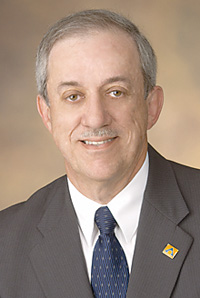MAUMEE, Ohio -- By his own admission, Tim Pontius's year as AAHomecare's chairman, which ended in June (the same month he sold his company, Young Medical, to Apria), was bittersweet. The association didn't deep six Medicare reimbursement cuts to respiratory medications and home oxygen services, but it did succeed in significantly reducing the size of those cuts. Many providers, however, view anything short of total victory as a failure. Those providers, especially those who complain but don't belong to AAHomecare, weigh heavily on Pontius. "Gosh, I feel like it has been like 12 months with the throttle to the floor, and you are giving everything you've got, and then every time we turn around we keep running into the same thing: What have you done for me lately?" he said. HME News recently conducted an exit interview with Pontius. Here's what he had to say:
HME: Some state association members came out this summer and criticized AAHomecare for not doing enough to fight competitive bidding. What do you say to these providers?
TP: If you are not a member or your [state] association is not a member of [AAHomecare], it is going to be hard to keep track of what is going on. I'm not blaming anyone for not knowing. If I blame them for anything, it's for not seeking out the answers before going public and starting to tear down the universe I live in. It's always easier to stand on the sidelines and say, 'They are not doing enough to help the little guy or to help the mid-sized guy. The fact of the matter is we have to help each other.
HME: Some industry leaders say AAHomecare's relationship with CMS has never been better. Do you agree?
TP: I would say that is so. There's a sense on Capitol Hill that this isn't a bad industry anymore. In general, the perception is that the industry has credibility, and that is step-one or step-two in a 10-step process.
HME: What evidence do you have that lawmakers and regulators have greater respect for the industry?
TP: The fact that we are not on the middle of a giant bull's-eye when the budget talks came out this year. I can't remember a time when we weren't on the front burner. Part of it is that over the course of the past couple of years are have started to educate members of Congress that maybe we aren't the biggest part of the problem and may be part of the solution. I think everyone is starting to recognize a little bit that maybe we need a longer term plan, give these guys a chance to adapt a little and see what impact it has on access and patient care and if there is no impact, maybe their is more room to maneuver, but if there is an impact we need to re-evaluate whether we can ask for more cuts.
HME: Looking back, is there anything you didn't accomplish that you wished you had?
TP: I wish the oxygen cut would have been minimized even more than it was because we really felt we had good, credible data, but again that is one of those things. I'm not throwing up my hands and saying it was a victory, but it was a giant step in the right direction from 20% where they started, and the fact that we got the OIG to go back and revisit their data from top to bottom and for CMS to support us in doing that. Those are all great things.
HME: That's a cup-half-full perspective. Others see any reimbursement cut as a failure.
TP: It is almost like running a marathon and coming in third and being disappointed that you didn't win. You have to consider that: A. We finished; B. We had a lot of goals, and we accomplished a significant portion of those goals.
HME: Do you have any regrets from your year as chairman?
TP: I would have hoped that we could have gotten more people from the industry involved than we have. If I feel like we are falling short, it is always trying to get more people involved.
HME: Why have more providers not teamed up with AAHomecare?
TP: I wish I had a good answer. I just think there is a general malaise in this industry. I would like to think it is because we are all back home working hard and keeping our businesses in line, and we don't have time to do that. But that is not it because what we ask of people doesn't require a lot of time. It doesn't require a lot of time to make two or three phone calls, or write a letter or send a fax to a legislator. Have we made significant improvement? In the last couple of campaigns I think we've seen tremendous support from members out there, but it still is the same states and member stepping up and doing more.
HME: Would AAHomecare have achieved significant more success if more providers participated in its lobbying efforts?
TP: If you take half the people in this industry, put them in the association for one year, and we all committed to do as much as we could to help the industry, not to sound corny, but we could change the world.




Comments